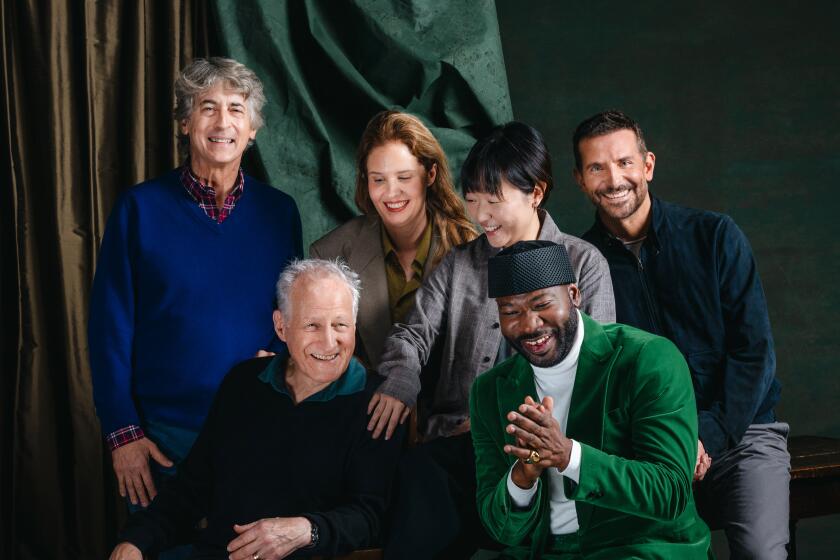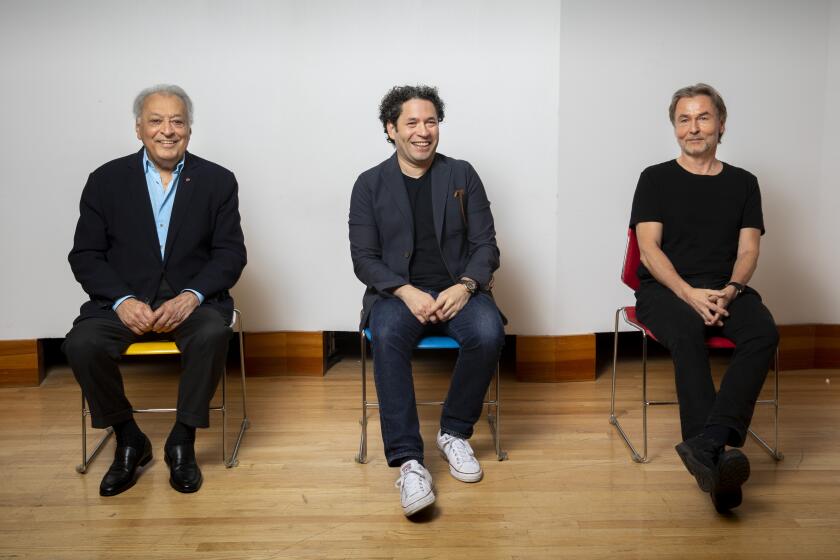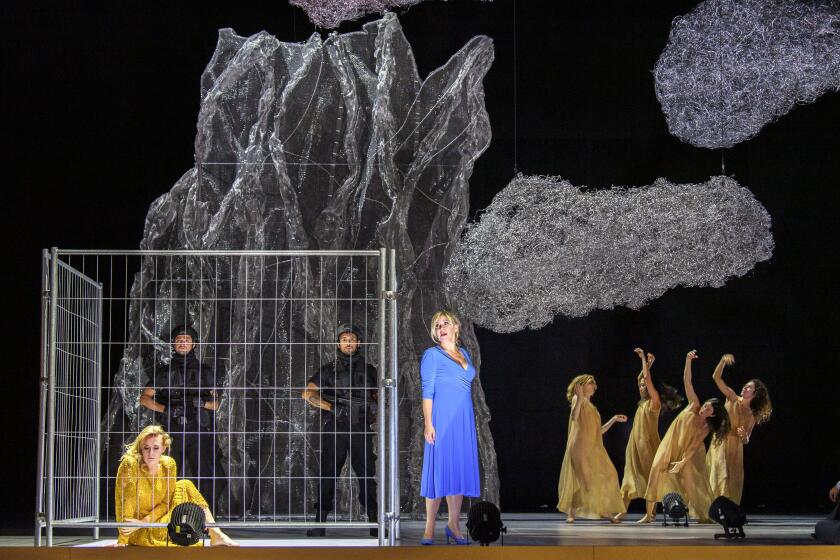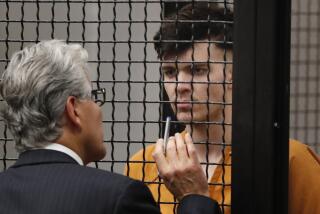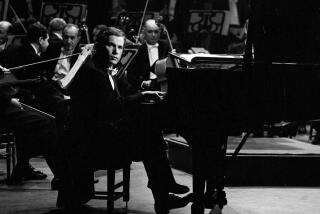Netflix has âMaestroâ mania. But for this music critic, the essence of Lenny is missing
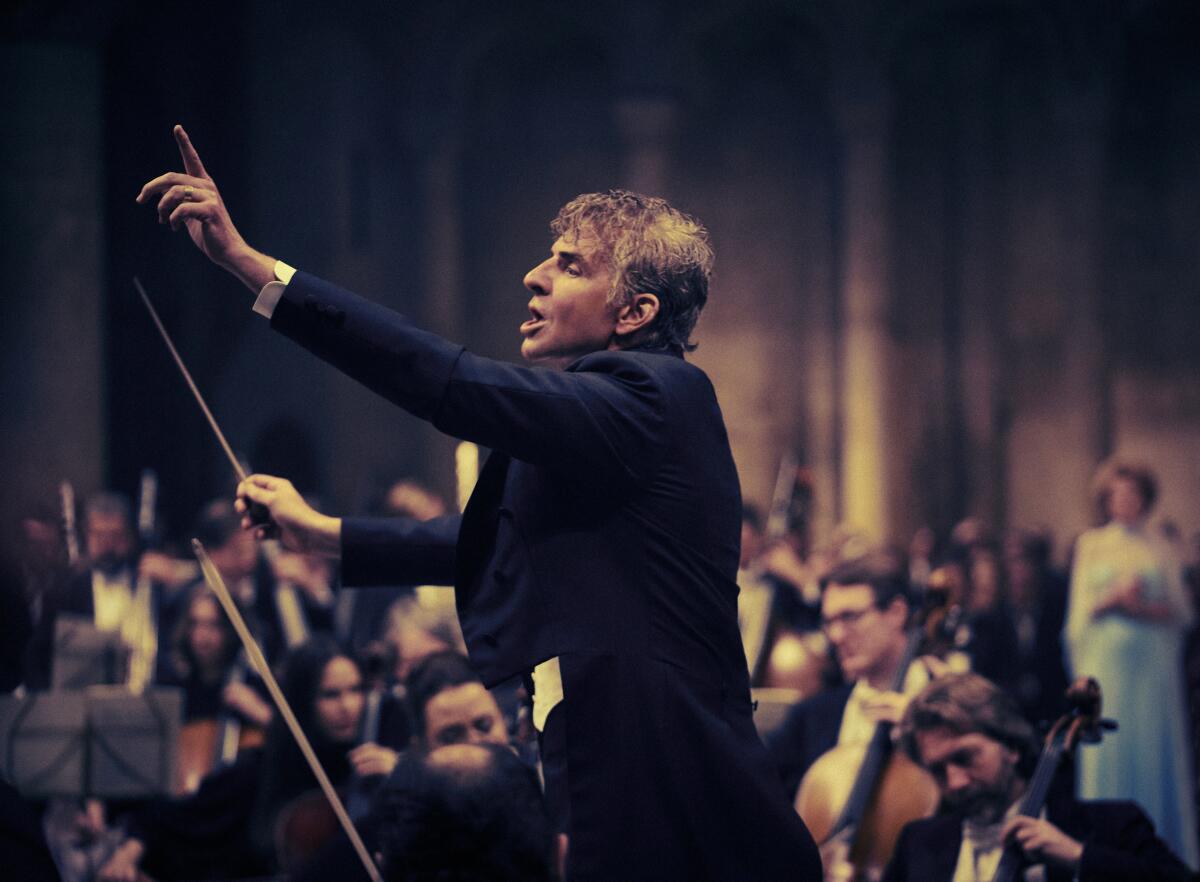
âMaestroâ is pretty good. At least that appears to be the overall verdict from critics and audiences (80% and 85% positive ratings, respectively, on Rotten Tomatoes). In my sphere, the classical music community reaction has been a collective sigh of relief.
The Leonard Bernstein biopic is not mean-spirited as âTĂĄr,â about a fictional conductor and Bernstein prodigy. Besides being a great conductor, composer, pianist and educator, Bernstein wrote a winning bestseller, âJoy of Music,â and thankfully âMaestroâ is not joyless.
At the world premiere of the film in Venice, Italy, Bernsteinâs three children were seen dancing in the aisles as the credits rolled. At the Chinese Theatre in Hollywood, where I saw âMaestroâ as part of the AFI Fest, Jamie Bernstein jubilantly introduced the screening by saying that Bradley Cooper â the filmâs director and star â nailed her dad. Ditto Carey Mulligan, who portrays her mother, actress Felicia Montealegre Bernstein.
Directors Blitz Bazawule (âThe Color Purpleâ), Bradley Cooper (âMaestroâ), Michael Mann (âFerrariâ), Alexander Payne (âThe Holdoversâ), Celine Song (âPast Livesâ) and Justine Triet (âAnatomy of a Fallâ) on how they do what they do.
One of the reasons why âMaestroâ comes across as pretty good, or maybe even a little better than that, is because it is not really about music. Cooper was strongly influenced by Jamie Bernsteinâs memoir, âFamous Father Girl,â and in fine Hollywood fashion better realizes not what made her father famous but what he was really like. The man behind the myth.
âMaestroâ is seemingly an ironic title. As the first American-born conductor to become music director of the New York Philharmonic in 1957, Bernstein did away with many Old World formalities and grand maestro-esque titles. He was Lenny to just about everybody.
Bisexual, Bernstein began an affair in 1971 with a dazzlingly brilliant young man from Pasadena, Thomas Cothran, which, when discovered by Felicia, led to a breakup of the Bernsteinsâ marriage. Tom happened to be a classmate of mine at Pasadena High School and we became good friends. Heâs Tommy in âMaestroâ (he never would have put up with that from anyone other than Bernstein) and dismissed in the film as little more than a casual attraction.
Tom and Lenny lived together for a predictably incompatible year. Tom had little patience for Lennyâs late-night bouts of insecurity and, by his telling, was able to trim some of the excesses from Bernsteinâs 1973 Norton Lectures, âThe Unanswered Question,â at Harvard University.
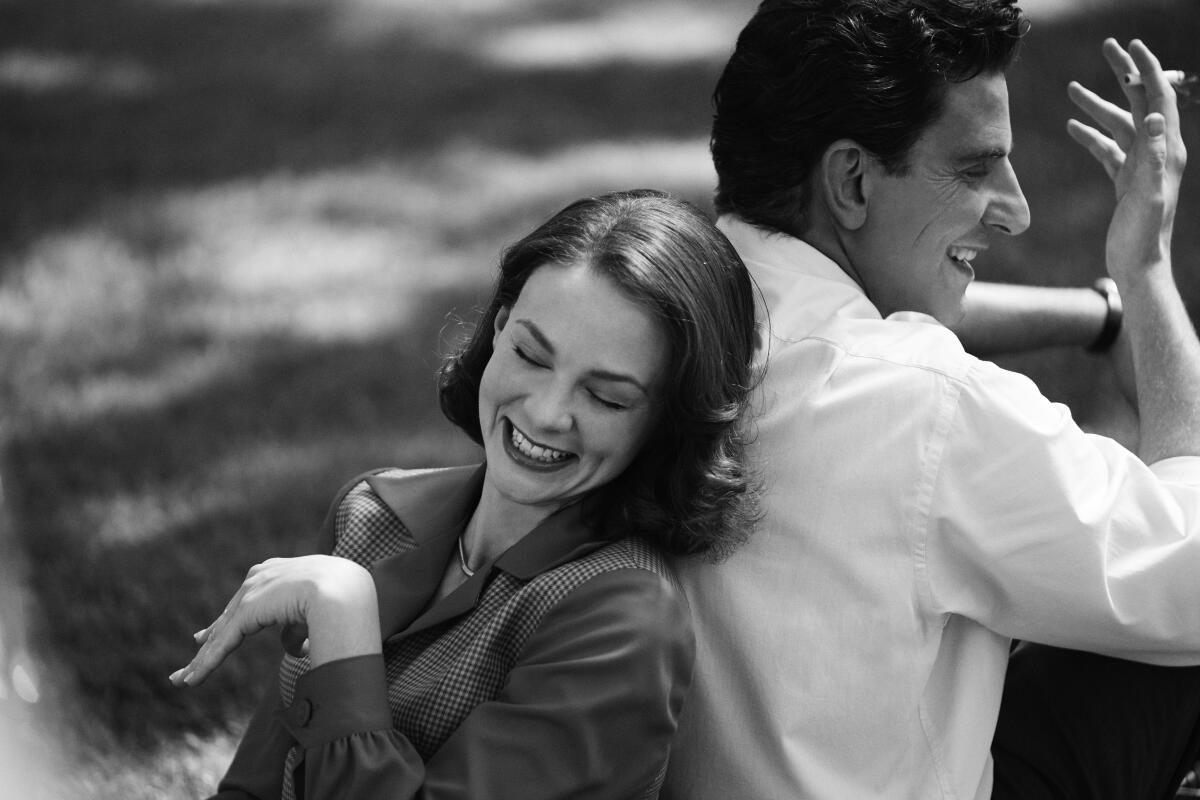
Bernstein returned to Felicia when she was diagnosed with cancer in 1976, and her death in 1978 was a terrible trauma for him. He never appeared to get over it. Fraught family life is obvious dramatic biopic fodder. But left out of this saga was the importance of Tom, who collaborated with Bernstein until Tomâs death from AIDS, reportedly, in 1987.
Other than this, the glimpses of family life are no doubt accurate. Cooper consulted with the Bernstein siblings, and they gave him permission to shoot at the family house in Connecticut. Makeup makes Cooper look like a close facsimile of the old Bernstein and a sort-of facsimile of the dashing younger one. Likewise, Cooper convincingly mimics the voice of the elder Lenny. He sounds unpleasantly shrill as the hyperactive young conductor and composer taking classical music, Broadway and ballet by storm.
Cooper actorly copies Bernsteinâs extravagant conducting style. But he lacks the mysterious magic and magnetism that could hold you and your emotions prisoner. Bernstein wasnât an actor, he was a seeker. I have never witnessed the kind of shamanistic power in a performance that Bernstein, at his most elevated, could produce. Love or hate his gestures, they are Bernstein in the flesh making music, and they cannot be transferred to anyone else.
That Lennyâs life was chaotic hardly comes as a surprise. He was drawn to many things. He wrote groundbreaking Broadway scores (including âWest Side Storyâ). He conducted with far more animation (and, for a long time, to the scorn of musicians, critics and uptight symphony-goers who wanted their music handed to them pristine). He wrote classical works that dealt with spiritual crises. It is often said that he was the greatest communicator music has ever known. His Young Peopleâs Concerts with the New York Philharmonic, nationally televised in the mid-1950s and early â60s, attest to that. They brilliantly demystified classical music to millions of viewers young and old. I was one of them.
Gustavo Dudamel, Esa-Pekka Salonen and Zubin Mehta prove just how much tradition can propel innovation.
How much Bernsteinâs private life personifies such artistry is always going to be a matter of interpretation. He obviously had a huge libido. He was drawn to an unprecedentedly wide range of musical activities and interests. He had an overpowering social conscience and involved himself in political activities.
He was highly literate, and delved deeply and tirelessly into philosophy, psychology and religion. He had an intense relationship with Judaism, questioning everything. He was gregarious and needed people. He was strikingly handsome and exuded sex appeal. He was a chain smoker to the end and drank way too much, put on weight in his 60s and had insomnia. He died in 1990 at 72 of emphysema. He was, above all, a conductor. Call him Lenny but do what he tells you, whether you like it or not.
He was on the road a lot of the time, and it is hardly surprising that Bernstein would have a varied, hyperactive sex life. But, by all accounts, he was a loving father and profoundly devoted, in his own way, to Felicia. There is enough interest in this for a pretty good Hollywood movie.
But that isnât what made Bernstein exceptional. It is everything else. The fact is Bernstein didnât have all that much time for family. He was doing a thousand things. When home, moreover, he worked like crazy, composing, studying scores, reading and writing. (He was said to practice the piano very little.)
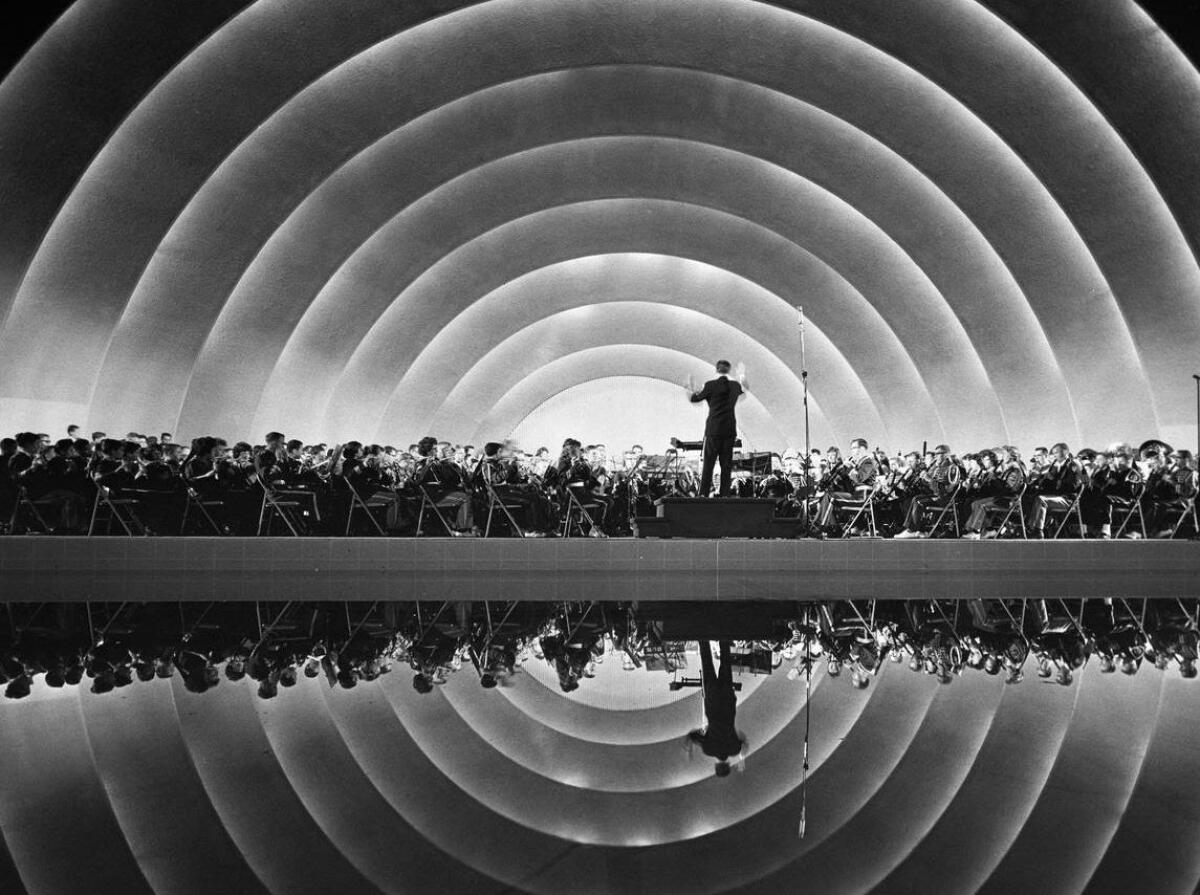
In the end Lennyâs love for music was the love he could share with the world, but that is far more difficult for an actor to convey. In addition, weâve seen so much Bernstein onscreen that anyone else trying looks like an AI fake.
Copying Bernsteinâs conducting is even more problematic. Cooper impressively mimics Bernsteinâs movements in a performance of the apotheosis of Mahlerâs Second Symphony at the Ely Cathedral in London, which Bernstein filmed. But you canât mimic essence. âDonât copy me,â Bernstein regularly told student conductors.
Worse, though, is the soundtrack, bits and pieces of Bernsteinâs music mainly with Yannick NĂŠzet-SĂŠguin conducting the London Symphony Orchestra. The recorded sound is bombastic; instrumental balances, grotesque; the conducting, bland. Had âMaestroâ explored Bernstein as musician and shaman more thoroughly, it would have had to show that this soundtrack, which needs to be the heart of the film, goes against everything Bernstein stood for.
The good news is that âMaestroâ may turn out to be good enough to promote a small wave of maestromania. Avoid the soundtrack recording at all costs: It is a headache-making mix track from Bernstein hell. But Bernsteinâs career happens to have been very well documented on recording and video, and nearly all of it remains readily available on vinyl, CD, DVD, Blu-ray and streaming.
Watch a Young Peopleâs Concert and youâll likely find one is not enough. If you want to know what Bernstein really thought about love, listen to his âSerenade (After Platoâs Symposium),â a love letter to Felicia that is also a warning that he was a rapturous and vivacious lover with an endless appetite. Bernsteinâs recordings of this quasi-violin concerto with Gidon Kremer as soloist make the rapture absolutely real.
A new Berlin production of Charpentierâs 1693 opera âMedee,â with direction by Peter Sellars and sets by Frank Gehry, offers vital perspective for our times.
More to Read
The biggest entertainment stories
Get our big stories about Hollywood, film, television, music, arts, culture and more right in your inbox as soon as they publish.
You may occasionally receive promotional content from the Los Angeles Times.
